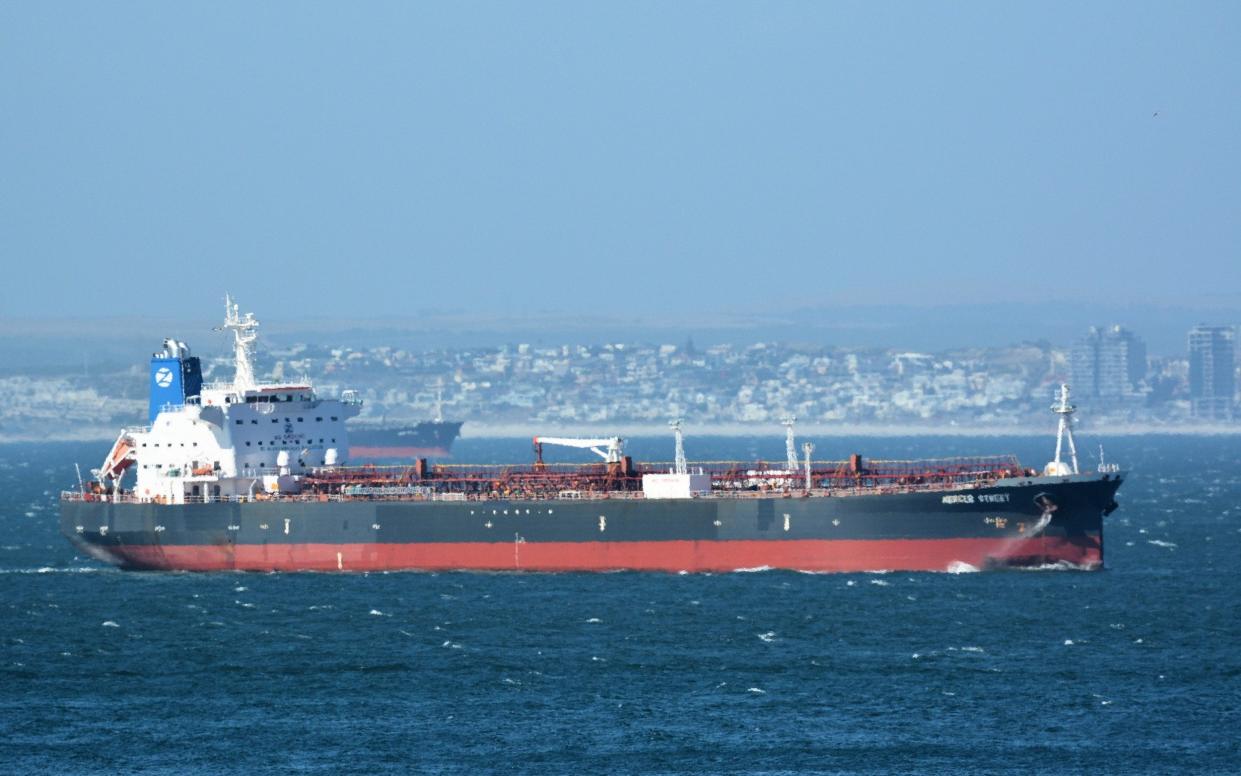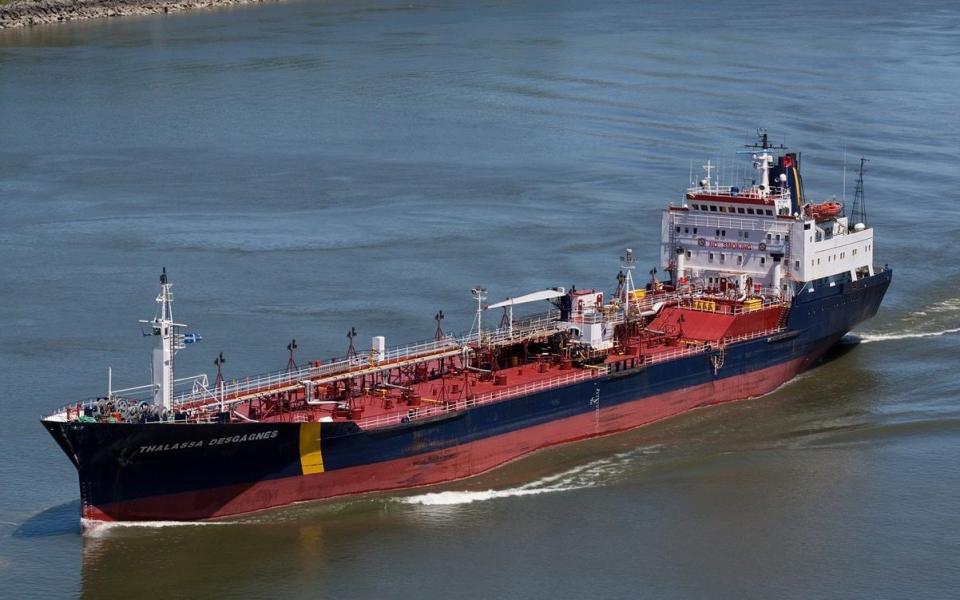Iran sentences British dual national to jail as Army chief says Britain must retaliate over ship attack

Iran has sentenced a British-Iranian man to more than a decade in prison on national security charges, amid rising tensions with Iran over the hijacking of a merchant vessel and a deadly drone attack on an oil tanker.
On Wednesday, an Iranian Revolutionary Court jailed Mehran Raouf, a 64-year-old British-Iranian citizen, and German-Iranian architect Nahid Taghavi for 10 years and eight months over "propaganda activities."
Mr Raouf is a former teacher from Islington who was living in Tehran when he was arrested, reportedly because he was discussing politics in a coffee shop with like-minded friends.
The latest prison sentences came as Iran continued to deny that it was responsible for last week's drone attack on the Mercer Street ship, which killed a British security guard and a Romanian citizen.
On Wednesdsay, General Sir Nick Carter said that the UK must retaliate against Iran to deter it from carrying out further attacks in the Gulf region.
Gen Carter, the Chief of the Defence Staff, told BBC Radio 4's Today programme: "What we need to be doing, fundamentally, is calling out Iran for its very reckless behaviour.
"They made a big mistake on the attack they did against the Mercer Street vessel last week because, of course, that has very much internationalised the state of play in the Gulf."
He added: "Ultimately, we have got to restore deterrence because it is behaviour like that which leads to escalation, and that could very easily lead to miscalculation and that would be very disastrous for all the peoples of the Gulf and the international community."
He was referring to a suspected Iranian drone strike on the Mercer Street oil tanker last Thursday which killed a British security guard and the vessel's Romanian captain.
The Israeli government on Wednesday publicly accused an Iranian military officer, Saeed Ara Jani, of being personally responsible for the drone attack on the Mercer Street, claiming he was the head of the Revolutionary Guards' drone unit.
"For the first time ever, I will also expose the man who is directly responsible for the launch of suicide UAVs [unmanned vehicles] - his name is Saeed Ara Jani and he is the Head of the IRGC’s UAV Command," Israeli defence minister Benny Gantz said.
"The UAV command conducted the attack on Mercer Street. Saeed Ara Jani plans and provides the training and equipment to conduct terror attacks in the region," Israeli defence minister Benny Gantz said.
The Telegraph has approached Iranian authorities for comment.
The UK citizen has been named as father-of-one Adrian Underwood, who was employed by the British security firm Ambrey.
Mr Underwood, who served in the British Army in the early 2000s, was described by friends as "a humble gentleman, funny and loved by so many," on a crowd-funding website honouring his memory.
It came as Dominic Raab, the foreign secretary, said he had written to the UN Security Council urging it to take action against Iran.
"The UK has written to UN Security Council President T S Tirumurti alongside Romania & Liberia to raise Iran’s attack on MV Mercer Street," Mr Raab wrote on Twitter.
"The Council must respond to Iran’s destabilising actions and lack of respect for international law."
The UK is taking the lead on the international response to Iran and is due to raise the issue at a UN Security Council meeting on Friday.
General Carter's remarks came as Iranian hijackers were accused of seizing an oil tanker off the coast of the United Arab Emirates in the Gulf of Oman on Tuesday, before leaving the vessel on Wednesday morning, the British Navy reported.
The British military's United Kingdom Maritime Trade Operations said that the "incident", which it had described as a potential hijacking on Tuesday, was now "complete". It did not provide further details.
The Financial Times reported that US military forces had gone to the area to investigate overnight. It was not immediately clear who was responsible for the attempted ship hijack.
According to the shipping news website Argus, the hijacked vessel was boarded by six Iranian nationals. The crew were unable to understand why the Iranians had boarded the ship, Argus reported.
Shipping authority Lloyd's List and maritime intelligence firm Dryad Global had both identified the hijacked vessel as the Panama-flagged tanker, Asphalt Princess. The vessel's owner, listed as Emirati free zone-based Glory International, could not immediately be reached for comment.
Lloyd's List reported that armed men had boarded the tanker and ordered it to sail to Iran. The incident took place in an area in the Arabian Sea leading to the Strait of Hormuz, the conduit for about a fifth of the world's sea-borne oil exports.
Apparently responding to the incident, Iranian Foreign Ministry spokesman Saeed Khatibzadeh described the recent maritime attacks in the Persian Gulf as "completely suspicious". He denied that Iran was involved.
"Reaffirming our strong commitment to regional stability and maritime security, Iran stands ready to offer assistance in case of any maritime accidents," he said.
On Wednesday, several rockets were fired by militant groups in southern Lebanon towards Israel which landed in an open area near the border and started a fire.
It was not immediately clear whether the rocket fire was linked to global tensions with Iran, though the Iranian proxy group Hizbollah is the most powerful armed force in Lebanon alongside the Lebanese army.
The Israeli military responded to the rockets with artillery fire on targets along the Lebanese border.

The events have unfolded amid heightened tensions between Iran and the West over Tehran's tattered nuclear deal and as commercial shipping in the region has found itself caught in the crosshairs.
Also on Wednesday, an Iranian Revolutionary Court has sentenced two dual nationals, a German-Iranian woman and a British-Iranian man, to over 10 years in prison each on national security charges, their lawyer said on Wednesday.
"Branch 26 of the Revolutionary Court sentenced Ms Nahid Taghavi and Mr. Mehran Raouf to 10 years in prison for participating in the management of an illegal group and to eight months in prison for propaganda activities against the regime," lawyer Mostafa Nili said in a Twitter post.
Mr Raouf is a former teacher from Islington who was living in Tehran when he was arrested, reportedly because he was discussing politics in a café frequented by workers' rights activists.
Iran's judiciary had yet to report the sentences. But Ms Taghavi's daughter Mariam Claren tweeted a confirmation of her sentence.
Late on Tuesday, as the incident was underway, six oil tankers off the coast of Fujairah also announced via their Automatic Identification System trackers that they were "not under command", according to MarineTraffic.com. That typically means a vessel has lost power and can no longer steer.
Fujairah, on the UAE's eastern coast, is a main port in the region for ships to take on new oil cargo, pick up supplies or trade out crew.
For the past two years, the waters off Fujairah have seen a series of explosions and hijackings. The US Navy blamed Iran for a series of limpet mine attacks on vessels that damaged tankers.
The US stopped short of assigning blame for the latest episode, but State Department spokesman Ned Price said there had been "a very disturbing pattern of belligerence from Iran".
"When it comes to this specific incident, it's too early for us to offer a judgement just yet," he said.
White House spokeswoman Jen Psaki said the US was in close touch with Britain over the "deeply concerning" incident.

 Yahoo News
Yahoo News 
